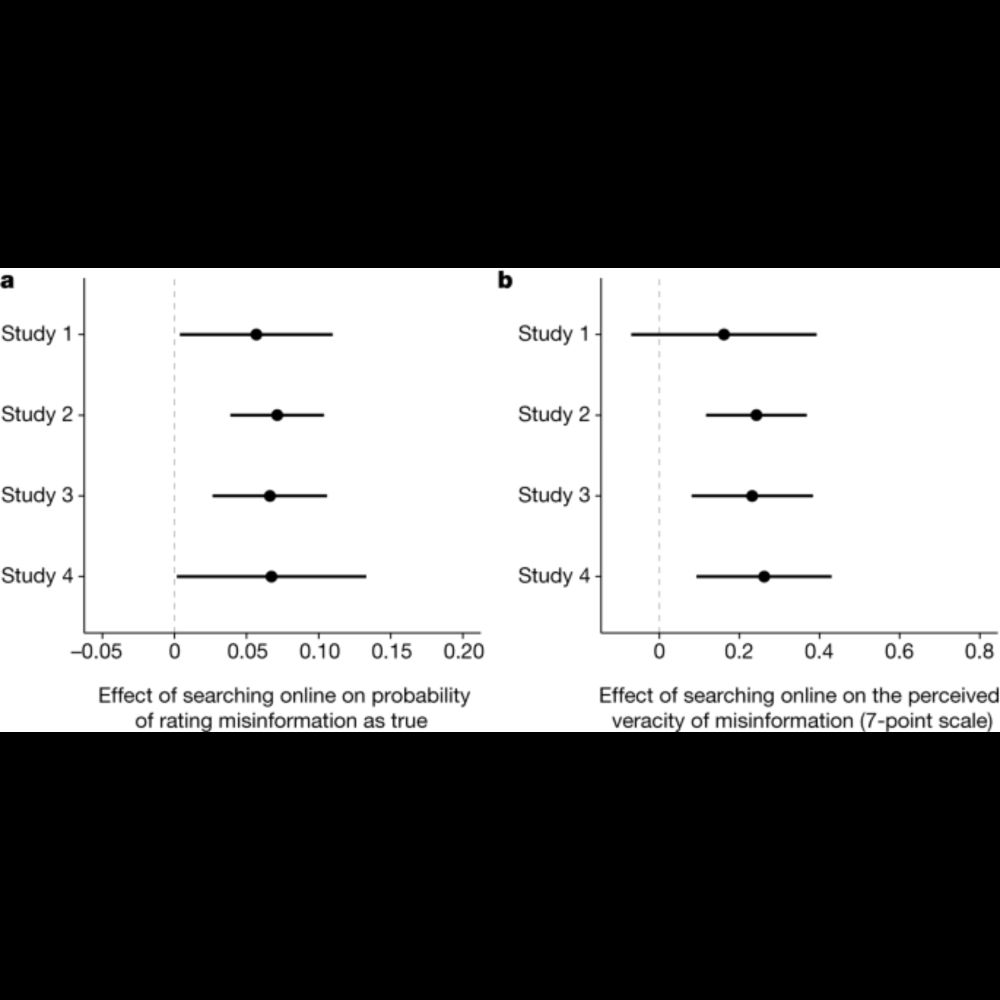
Online searches to evaluate misinformation can increase its perceived veracity - Nature
Searching online to evaluate the truthfulness of false news articles increases the probability of believing the false news articles.
Can searching for false news increase belief in misinformation? Yes, by approximately 20 percent, according to our new paper, out today in @natureportfolio.bsky.social. In addition, this phenomenon is concentrated among individuals for whom search engines return lower quality information.
👇🧵1/
20.12.2023 16:56 — 👍 54 🔁 39 💬 1 📌 9

Why ‘Doing Your Own Research’ May Make You Believe Fake News
A new study show how "doing your own research" can actually lead you to believe false stories and misinformation.
📢NEW from me, on misinformation: a team of US researchers has shown that "doing your own research" may cause you to believe fake news. With the generous help of @kevinaslett.bsky.social
20.12.2023 16:09 — 👍 5 🔁 1 💬 1 📌 0
My department is hiring a TT position in American Politics and I am on the search committee! Please share and if anyone has any questions, I would be happy to answer them. Just reach out to me at kevin.aslett@ucf.edu. Job ad below: ucf.wd1.myworkdayjobs.com/careers/job/...
27.11.2023 21:04 — 👍 4 🔁 0 💬 0 📌 0
This is New York: Intelligencer, The Cut, Vulture, Curbed, Grub Street, The Strategist.
Subscribe: http://nymag.com/subscribe
Get 'One Great Story' every day: http://nym.ag/3tRlORP
Nature Portfolio’s high-quality products and services across the life, physical, chemical and applied sciences is dedicated to serving the scientific community.
internet typist at the verge, known cat lady, zevon stan. she/hers/hesher
tip me: liz@theverge.com
Bayesian Statistician and Data Scientist in the Gaming/Entertainment Industry | Bayesian Statistics, Causal Inference, R, Python, Stan, Decision Theory, Guitar | Former Political Scientist
Political economist, John Dewey Distinguished Service Professor at University of Chicago Harris School of Public Policy.
ISW is a policy research organization focused on U.S. national security. Email: press@understandingwar.org. For more: https://linktr.ee/understandingwar
asst. prof. @uwsjmc.bsky.social rossdahlke.com
Asst prof at UTEP. Political psychology and political communication. Studying mental health, cognition, emotions, info behavior, & social media.
Professor of Practice at the Howard Center for Investigative Journalism at the Walter Cronkite School of Journalism and Mass Communication at Arizona State University
The Stanford Internet Observatory is a cross-disciplinary program studying the abuse of the Internet and providing thoughtful policy and technical solutions.
In-depth, independent reporting to better understand the world, now on Bluesky. News tips? Share them here: http://nyti.ms/2FVHq9v
We work to strengthen democracy by conducting rigorous research, advancing evidence-based public policy, and training the next generation of scholars.
https://csmapnyu.org/links
PhD Student University of Michigan School of Information & Michigan Institute for Computational Discovery and Engineering | formerly engineering @csmapnyu.org | NYU ‘19
Political Communication Professor at GWU. I write a lot about the history and future of tech and politics. Best known for that one time I made fun of Bret Stephens.
Davekarpf.substack.com
Politics Prof, NYU; Director @NYUJordanCenter for Adv Study of #Russia; Co-Director NYU Center for Social Media and Politics @CSMaP_NYU (http://csmapnyu.org); long suffering NY Mets fan; @j_a_tucker on other platforms; he/him
Political Communication researcher
policy, $, political economy of race // 70-80s soul, 90s hip hop // #DubNation // proud product of miscegenation // Berkeley prof (formerly: Princeton CSDP, UW)
Political scientist at the University of Utah. Public policy, political institutions, media and politics
Political economy, game theory, nonsense
https://sites.wustl.edu/keschnak/


